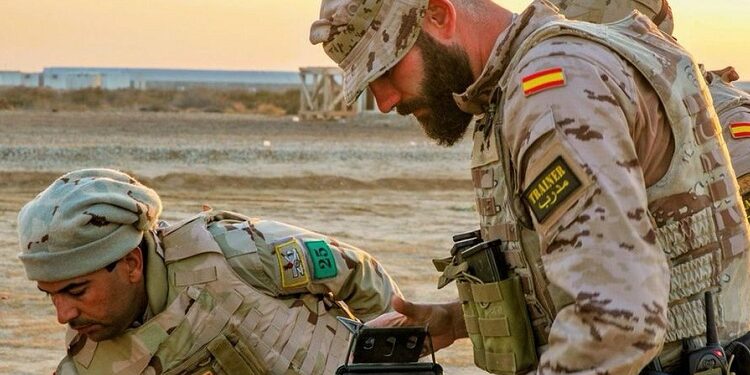The Diplomat
The Council of Ministers yesterday agreed to extend until 31 December 2023 the participation of Spanish military units and observers in peacekeeping operations abroad. Spain currently has more than 3,000 military personnel on missions abroad.
The Ministry of the Presidency, which publishes the agreement in the reference of the Council of Ministers, argues that the Government’s intention in these difficult times for international stability is to continue to maintain an unequivocal commitment to peace missions.
“A commitment of the Armed Forces, which is based on the principles of responsibility, solidarity, constancy, determination and unity, endorsed in NATO’s new Strategic Concept and in the guidelines of the European Union’s Strategic Compass,” it adds.
In general terms, the Government plans to maintain the level of participation of the Armed Forces in Foreign Operations during 2023, including the continuity in the command of the UNIFIL and EUTM Mali missions, which Spain currently performs, and the future leadership of the NATO Mission in Iraq (NMI).
As for deployment within the Euro-Atlantic area and territory for reinforcement and deterrence on NATO’s Eastern flank, this will again be influenced by the evolution of the crisis in Ukraine and the situation vis-à-vis Russia. Depending on collective decisions within the Alliance, this could result in one-off increases, which are expected to be slight and of limited duration.
Thus, the authorisation for the participation of the Armed Forces and Civil Guard, and of military observers, in operations outside national territory is extended until 31 December 2023.
The missions of the Armed Forces and the military missions of the Guardia Civil abroad, the extension of which is authorised, have been approved by the Cortes Generales, in compliance with the provisions of Organic Law 5/2005 on National Defence.
More than 3,000 military personnel deployed abroad
Spain has more than 3,000 military personnel deployed on missions abroad, a third of them in NATO operations on the border with Russia to deter a possible armed attack on one of the Alliance countries.
According to the information sent by the Ministry of Defence to the parliamentary groups, to which Europa Press had access, as of 1 December a total of 3,036 troops were participating in international operations under the NATO, EU or UN flags.
The majority, up to 1,100 military personnel, are taking part in one of the missions deployed on the eastern flank of the Atlantic Alliance. Spain’s presence in these deterrence operations has been considerably reinforced since Russia’s military offensive began.
The Latvian mission has gone from 350 troops to over 600 in one year. Defence made “operational adjustments” there during the first quarter of the year by sending more soldiers and later deployed an anti-aircraft defence unit with a NASAMS battery.
In addition, Spain has multiplied its participation in air policing missions in eastern NATO during 2022 and during the year made non-simultaneous deployments to Bulgaria, Lithuania, Estonia and Romania. Fighter jets are currently deployed in Romania to monitor the skies over the Black Sea and a long-range surveillance radar is also on Romanian soil.
In addition to these deployments, the navy participates in the Sea Guardian mission in the Mediterranean and NATO’s standing naval forces, with 227 personnel. The frigate ‘Cristóbal Colón’ is currently part of one of these groupings, the SNMG-2 escort grouping.
In any case, the largest mission continues to be the UN mission in Lebanon, with 646 soldiers and led by Spanish General Araldo Lázaro since February. Just last week an Irish soldier was killed in the country and others were wounded in an attack on the convoy in which they were travelling.
Spain also maintains its presence in Turkey with an anti-missile battery and 149 troops, and has another 300 military personnel deployed in Iraq on NATO missions and in the international coalition against terrorism led by the United States. An army general is scheduled to lead the NATO mission between May 2023 and May 2024.
Uncertainty in Mali
In Africa, the largest mission continues to be that of the European Union in Mali, with 316 troops despite the paralysis of the mission since February, when the EU decided to suspend training the local army due to the political and security instability in the country, the arrival to power of a military junta responsible for two coups d’état in less than a year, and the growing influence of Russia.
Precisely last week, Spanish General Santiago Fernández Ortiz-Repiso took command of the operation, although in the documentation submitted to Congress, Defence does not detail the future it envisages for the mission, which the EU has already said it wants to reduce considerably until the situation becomes clearer. The instability in the Sahel has already led to the reduction of the presence in the Central African Republic to the eight soldiers who remain at present.
In addition, Spain has an air detachment in Senegal to provide logistical support to both missions and other European countries’ operations in the area, such as France. Defence points out that the reorganisation of French forces in the Sahel does not represent a change in the profile of Spanish aircraft flying missions, although there has been a decrease in work in Mali and a shift of operations to the east and countries in the Gulf of Guinea.
On the African continent, a total of 284 military personnel are also participating in Operation Atalanta to fight piracy in the Indian Ocean and protect World Food Programme ships, in addition to another 21 troops deployed in Somalia and another 93 involved in cooperative security activities. During 2022, activities of this type have been carried out in Senegal, Mauritania, Tunisia and Cape Verde, in addition to two deployments of Navy patrol vessels in the Gulf of Guinea.
Finally, Spain has five military personnel in Colombia as part of the UN mission as observers of the peace agreement and another three in Bosnia with the EU to support its government in maintaining security and contributing to the country’s stability.







